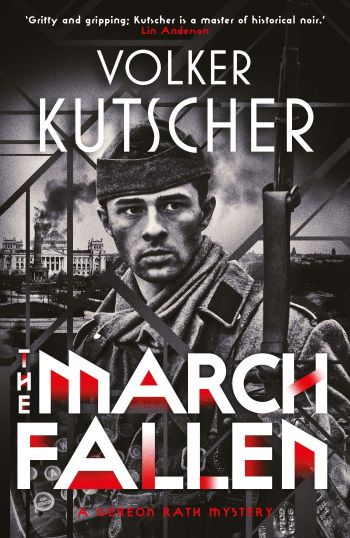This is the fifth book in the Gereon Rath series
by German author Volker Kutscher. The first two books, Babylon Berlin
and The Silent Death, have been adapted for TV as Babylon Berlin
and is available on Netflix for those of us in the States. The books take place
in Weimar Germany beginning in the spring of 1929 and my understanding is that
the series will continue until the start of World War II in September 1939 when
Germany invades Poland.
Rath is a police detective who has fled his native Cologne
for Berlin after he accidentally kills a man. He is given a ribbing by his
new co-workers for being a country bumpkin in the big city. Berlin was and
still is, from what I gather, the hedonistic capital of Germany. Perhaps even of
Europe more generally. You can really let your freak flag fly there. During the
1920s there was cabaret, various erotic clubs where transvestitism was often
not frowned upon, drugs, prostitution – a place of decadence and transgression.
Rath is a good Catholic boy in a den of sin.
This time around Rath is investigating the death of a World War I veteran whose body is found underneath a rail overpass. It being February 1933, he now he has to contend with a police department that is becoming ever more politicized as the police chief is a Nazi.
The Nazi presence/menace has been around since the first book and gotten more prominent with each succeeding one. With The March Fallen they have stepped out of the background and into the light. It's early 1933 so Hitler is chancellor, not dictator, but he is a polarizing figure for the characters. Swastikas are to be found hanging in public and the SA, a Nazi paramilitary organization, roams the streets having basically been deputized in service of the police. Some are dyed in the wool believers in the Nazi cause while others, like Rath's fiancé Charlotte Ritter who is trying to break the police gender barrier, are adamantly opposed. Others join the Nazis out of sheer self-interest or just to stay out of their crosshairs. Germany has begun dancing on the edge of the volcano. We the readers know how things pan out and so the political backdrop adds more layers of tension beyond the murder mystery at the heart of the story.
While Rath is an angel in contrast to the Nazis, he is far from perfect. Earlier in the series he was addicted to morphine as a result of his experiences in the war. Here, he continues his relationship with the Berlin mafia, the Ringvereine, and, in one scene, he and Charlotte dispose of some evidence, shall we say. Plus he engages in a little blackmail.
One of the neat elements of these books is how Berlin itself is almost a character akin to London in Ben Aaronovitch's Rivers of London series. It's quite the milieu of rich and poor, exotic dancers and construction workers, communists and democrats, and so on. Rath's work takes him all around Berlin and Kutscher rattles off all kinds of places that would have been or are familiar to Berliners – Alexanderplatz, the Ku'damm (think State Street, my fellow Madisonians), the ginormous KaDeWe department store (I thought of the Marshall Fields on State Street in Chicago), and so on. The variety of locations makes the city come alive on the page which makes for wonderful reading even if I have to look up many of the locations.
While there are eight books in the series thus far, only the first five have been translated into English. And, sadly, only the first three have been published in the States so you may need to find an independent bookseller abroad to get volumes 4 and 5. But do take the plunge.

No comments:
Post a Comment